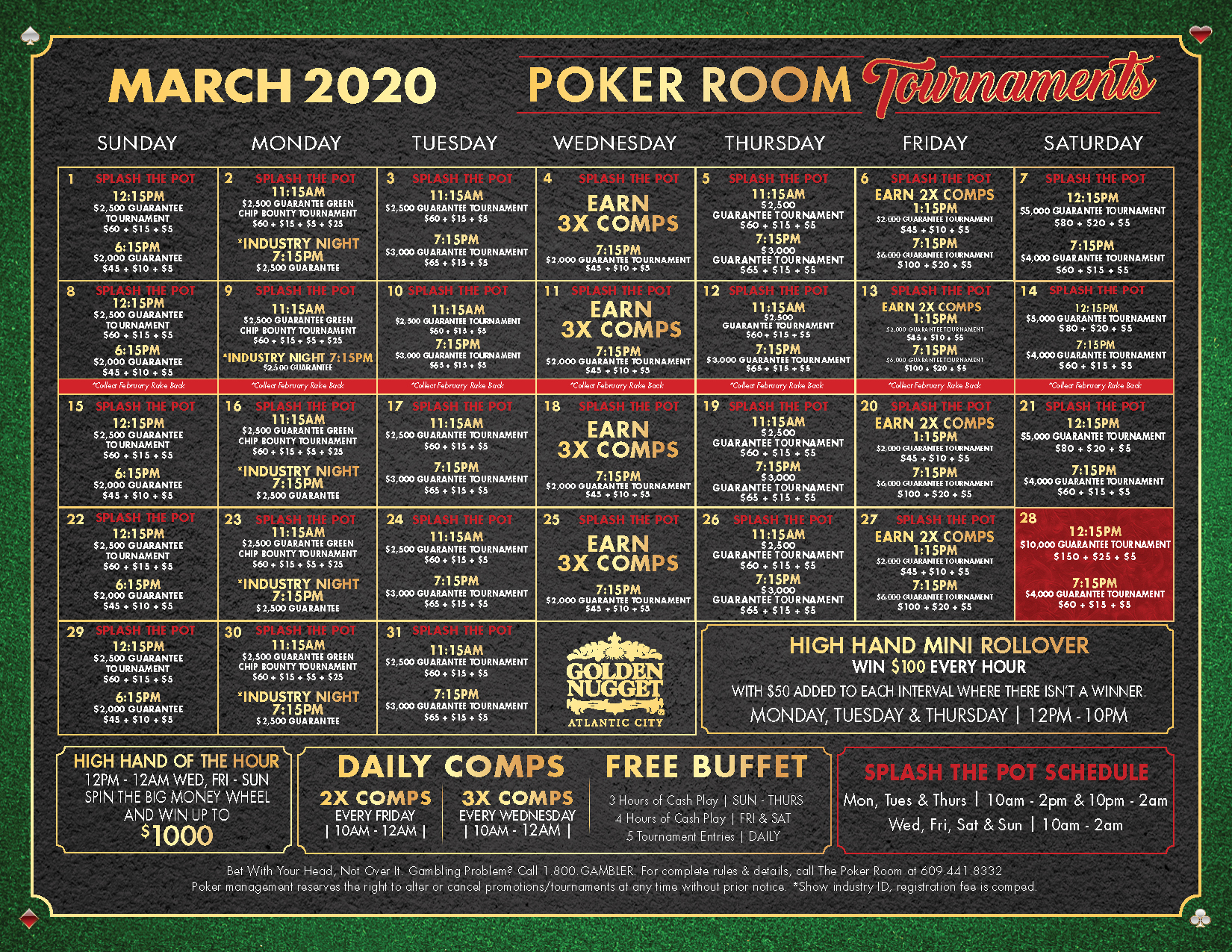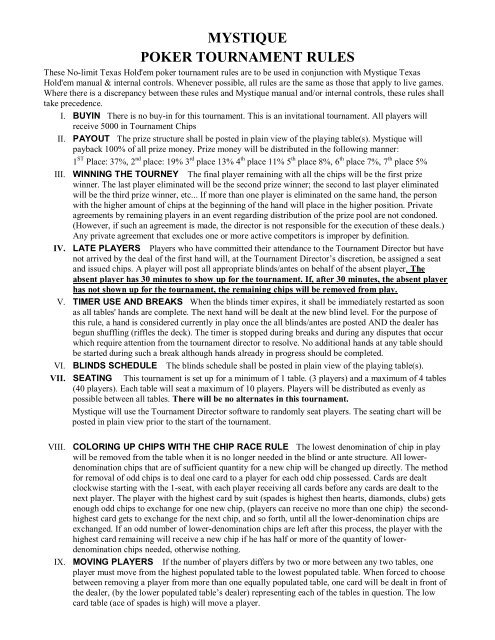Tournament Poker Rules
Table Of Contents
Other Poker Game’s Rules:
The rules above are from “Robert Rules of Poker” which is authored by Robert Ciaffone, better known in the poker world as Bob Ciaffone, a leading authority on cardroom rules. Categories: Playing Poker Poker Rules Poker Tournaments. The TDA has developed the following tournament poker rules,which supplement the standard or 'house rules' of a card room/casino. If there is a conflict between these rules and the rules and regulations of the applicable gaming agency, the gaming agency rules apply. TDA Rules Payout Chart. Poker tournaments begin at a designated start time, and most tournaments also have a late registration period. After registering, players are seated at random. Tournament rules dictate how many players can be seated at the same table. This number is generally anywhere from 6-10 players per table. The Poker TDA is a voluntary trade association of the poker tournament industry. The Association is dedicated to adopting a uniform set of poker tournament rules worldwide. View Official TDA Rules The most current version of the. Omaha Poker Rules. Omaha poker is an action game often played as a pot-limit or fixed-limit game. 7-Card Stud Rules. An old-but-gold poker classic that does not involve a flop and is often played.
Learning how to play poker should not be difficult. If you want to understand why so many people love this game, this beginner's guide to the rules and the basics of poker is all you need.
Poker is a simple game to learn, but the poker rules can be challenging for a complete beginner.
But don't let that put you off. It is not hard to learn how to play poker, and you can move from the basics of the game to the tables of the top online poker sites in no time.
Here's everything you'll learn in this guide on how to play poker:
- And lots more
Before you move to the 'practical' side of this guide on how to play the most popular variants of this game, you need to learn the basics of poker.
When most people say they want to know 'how to play regular poker,' they imply that they want to learn the basics of Texas Hold'em.
Texas Hold'em is (by far) the most popular poker game out there and it's the one you find at every online poker site.
But that's just the tip of the iceberg. With so many poker variants to play online and offline, the only proper guide on how to play poker for dummies is the one that gets you access to all the best games out there.
Not just to the most famous one.


Many poker rules are consistent from game to game, although among the dozens of variants such as Texas hold'em, Omaha, and seven-card stud you will find some ket differences you need to kno.
Let's have a quick look at the poker rules of the most played poker games online:
How to Play Texas Hold'Em
| Game | Texas Hold'em |
| How Many Players | 2-10 |
| Poker Rules | How to play Texas hold'em |
Also called the 'Cadillac of Poker,' Texas hold'em is the one you are going to play over and over again.
This is the most popular poker game online and it is also the one you are most likely to play with our friends in your next home game.
Whether you play it in the form of a tournament or as a ring-game, the basic poker rules and the hand rankings don't change.
> Discover how to play Texas Hold'em
How to Play Omaha Poker
| Game | Omaha Poker |
| How Many Players | 2-10 |
| Poker Rules | How to play Omaha |
| Where to Play | Top poker sites |
The second-most popular poker variant. Omaha poker finds its roots in the game of Texas Hold'em, although the rules of the two games are slightly different from each other.
Many players find learning how to play poker Omaha to be the natural step to take after they have successfully mastered the basics of Texas Hold'em.
In the poker rules page dedicated to the game, you find the perfect beginner's guide to moving your first steps in the world of Omaha.
> Learn how to play Omaha poker
How to Play Seven-Card Stud
| Game | Seven-Card Stud |
| How Many Players | 2-8 |
| Poker Rules | How to play 7-card Stud |
| Where to Play | Top poker sites |
Before Texas hold'em became king, anyone who wanted to learn the basic poker rules and how to play poker had to go through the game of seven-card stud.
As the name suggests, this is a variant of stud poker. 7-card stud is also the 'S' game in the H.O.R.S.E. poker — but if you are still learning how to play poker, it's probably too early for you to jump on that.
> Discover how to play seven-card stud poker
Other Poker Rules to Learn
If you want to go deeper and you want to learn how to play even more poker games, PokerNews is the right site for you.
Pick one poker variant to learn from the list that follows and find out how to play some of the most exciting and lesser-known poker games out there!
Use these guides to learn how to play poker and master not only the most 'obvious' games like Texas hold'em bu also all the other different variants out there.
In our guides for beginners, you find the official poker rules, the basic strategy tips, and the hand rankings — because knowing how to calculate points is key if you want to win at poker.
Common Traits of Most Poker Rules
The Value of Poker Hands
One element used in most poker variants is the system of hand rankings.
The highest ranked hand is a Royal Flush (five cards of the same suit, ranked ace through ten), followed by a Straight Flush (five cards of the same suit of consecutive ranks).
The third-best combination is the Four-of-a-kind, which is then followed by the Full House (three of a kind plus one pair), the Flush, the Straight, the Three-of-a-kind, Two Pair, One Pair, and High Card or no pair.
When a hand reaches the showdown, the player with the highest-ranked hand wins the pot.
That's true of Texas hold'em, pot-limit Omaha, seven-card stud, and five-card draw.
Of course, in 'lowball' games like razz or deuce-to-seven triple draw, the hand rankings are turned upside down and the 'worst' hand according to traditional hand rankings is the winning one.
Poker Hands Ranking
- Royal Flush10JQKA
- Straight
Flush56789 - Four Of
A Kind3333K - Full HouseJJJKK
- Flush2459K
- StraightA2345
- Three Of
A Kind45777 - Two Pair499KK
- One Pair3QK1010
- High Card248QK
Suggested Readings
- Poker Hands Chart: The official classification of all poker hands with a free pdf to download and print.
- What Beats What in Poker: the perfect starting guide to learn how to count points in poker and discover the real value of each hand.
Blinds and Ante Bets
Games like hold'em and Omaha feature small and big blinds, so called because they are 'blind' bets players have to make before they are dealt any cards.
Meanwhile stud games usually use 'antes', which also involve players putting chips in the middle before the hand begins.
From there players bet more as the hand progresses, thereby creating larger pots.
Limit vs. No Limit Poker Games
Some games are played with no-limit betting, which means players can bet as much as they like at any point in the hand, including going 'all in.'
Wsop Tournament Rules 2018
Pot-limit betting means that the current size of the pot creates an upper limit on how much a player can bet.
Games that are played with fixed-limit betting have predetermined amounts from which players cannot vary when they make their bets and raises.
The Action
There are other terms that tend to be used in all different poker games, including many having to do with the actions you perform when playing.

When the action is on you, you can:
- Check: Decline to bet
- Fold: Withdraw from the hand, if someone else has bet already
- Bet: Place a wager on the table
- Raise: Add more chips by matching your opponent's bet and putting in a greater amount.
- Call: Match the bet of your opponents to stay in the hand and continue to play.
All of those terms are an important step in your journey to learn how to play poker since they tend to come up in all poker variants.
The Betting Rounds
In games with community cards like hold'em and Omaha (also sometimes called 'flop games'), the betting rounds are referred to as:
- Preflop: The bets made before any community cards are dealt
- Flop: The bets made after the first three community cards are dealt)
- Turn: The bets made after the fourth community card
- River The bets made after the fifth and last community card.
Suggested Readings
- How to bet in poker: a beginner's guide to betting in Texas hold'em.
- Texas hold'em betting tips: This short article gives you some actionable tips to learn how to play poker with your stack of chips.
The Table Stakes
One other poker rule common to just about every variant of the you'll play – whether you are playing live poker or online poker – is one called 'table stakes.'

Table stakes means that once a hand begins, you can only bet whatever amount you had on the table to begin the hand and are not allowed to add anything more during the hand as it plays out.
If you only have $100 on the table to begin a hand, you can't pull out your wallet and add more halfway through the hand – you can only play out the hand with whatever you had to start.
Practice Poker Online for Free
Now that you know the basic poker rules and you have links to go back to your poker guides when you need to, it's time to look for the best websites to practice poker online.
Don't start to play poker for real money right away. Try out the games for free first. That's the only way to discover if you have really learned how to play poker.
Looking for a site to practice online poker for free?
Don't miss the updated list of the best free poker sites in 2020!
There are countless options to give the game a test run, but the best way is to try out the real deal.
Sign up for a poker account with one of the big online poker rooms and give the freerolls a try.
That way, you can practice poker online without any risk; you're not wagering any money.
And if you want to try out cash games instead of tournaments, all major poker sites online have so-called play money tables.
That way you can practice the game, learn the rules, and figure out how the software works, readying yourself for the big stage.
Register a free gaming account and test your poker knowledge in the next freeroll!
The following rules will apply to all tournaments unless otherwise stated.
Couples Poker Tournament Rules
Registration
- Sit & Go tournaments start as soon as the required number of players takes a seat. Players choose their seats on a first-come-first-served basis.
- Players will be allowed to unregister from a Sit&Go tournament as long as not all the seats have been filled.
- Multi-table tournaments start at predetermined times. Players will be randomly seated.
- Late registration is available in selected multi-table tournaments. Registration is considered closed when any of the following occurs:
- The level specified in the 'Tournament info' window in the Lobby is reached.
- The tournament's maximum capacity is reached.
- When the tournament has awarded the first prize rank.
- At the end of Add-On and Rebuy period.
- Players will be allowed to unregister from a multi-table tournament up to 5 minutes before the tournament start time providing registration is still open. Players who register less than 5 minutes before the tournament start time will not be able to unregister.
- All players in tournaments will be forced to post all blinds and/or antes. Players who are not present and ready to play will be blinded/anted off.
- There will be a five-minute break every hour in all scheduled tournaments, unless otherwise stated.
- Players moved to a new table will be dealt in to the game as soon as possible.
- In general, each player will post a small blind and a big blind every round. Collapsing tables and moving players mean it is possible that any of the following may occur at any time:
- A player may be forced to post the big blind more than once per round.
- A player may be positioned with the button for more than one hand.
- A player may skip one or both blinds in a round.
- Since these are basically random occurrences, no player will receive any long-term advantage, and the rule is necessarily fair for all players.
- In tournaments, seats are randomly assigned prior to start.
- With the exception of rebuy tournaments, a player is eliminated when he loses all of his chips.
- In limit tournaments (fixed betting), there will be one bet and three raises in each betting round. When only two players remain, there is no limit on the number of raises. In pot-limit and no-limit tournaments, there are no limits on the number of raises.
- When two players remain, the player due to assume the big blind will do so, and the small blind will inherit the button. The small blind or button will act first prior to the flop and second after the flop.
- If two (or more) players from the same table are eliminated on the same hand, the player who started the hand with the most chips will be awarded the higher finishing position.
- Tournaments will, at pre-determined times, go into 'hand-for-hand' mode. This allows tables to play the exact same number of hands at critical times.
- When tournament is running hand-for-hand, and two or more players are eliminated on the same hand (from the same table or from different tables), then the player who started the hand with the most chips will be awarded the higher finishing position.
- Players are expected to follow established poker etiquette. Any players who abuse proper etiquette may be disqualified from the tournament.
- Soft playing is not allowed in tournaments. Soft playing happens when a player does not bet his hand to its full potential with the expressed intent of helping another player advance further in the tournament.
- Players who do not act on their hand in time ('time out') will be automatically folded.
- Single Table Sit & Go tournaments, Multi Table Sit & Go tournaments & Multi-table tournaments: if a tournament is cancelled for technical reasons, the following refund policy will take effect:
- If the tournament has not yet started:
- All registered players will be refunded their buy-in and entry fee
- If the tournament has started but registration for the tournament is still open (ie the tournament is still in the late registration period)
- Eliminated players at the time of cancellation will not be refunded their buy-in or entry fee
- Players still in the tournament will be refunded their buy-in and entry fee.
- Any buy-ins (excluding entry fees) collected from players who have been eliminated from the tournament will be distributed on a percentage basis to the remaining players according to each remaining player's chip count.
- The tournament will only pay out funds which have been collected in buy-ins. Any guaranteed prize pool amount from the tournament will not be a relevant factor in calculating payouts.
- If the tournament has started and the registration period for the tournament has closed:
- Eliminated players at the time of cancellation will not be refunded their buy-in or entry fee
- Players still in the tournament will be refunded the amount that would have been awarded to the next player to be eliminated from the tournament. 50% of the remaining prize pool will be distributed equally between the remaining players, and 50% will be distributed on a percentage basis according to each player's chip count. The remaining players will also be refunded their entry fee.
- In extraordinary circumstances where the quality of our service is severely degraded, such as may happen due to the occurrence of an Act of God, a terrorist attack, fire, or malicious DDoS attack, we reserve the right to cancel tournaments and refund players their buy-in and entry fee only for tournaments where the actual prize pools may be less than guaranteed prize pools. In such an event we will refund all players their buy-in and entry fee, including those players who were eliminated at the time of cancellation.
- If the tournament has not yet started:
- Sit & Go Hero tournaments. If a tournament is cancelled for technical reasons, the following refund policy will take effect:
- If the tournament has not yet started
- All players will be refunded their buy-in and entry fee
- If the tournament has started
- Eliminated players at the time of cancellation will not be refunded their buy-in or entry fee.
- Players still in the tournament will be refunded the amount that would have been awarded to the next player to be eliminated from the tournament. 50% of the remaining prize pool will be distributed equally between the remaining players, and 50% will be distributed on a percentage basis according to each player's chip count. The pre-determined bounty amount will form part of the total prizepool if this has not already been won. The remaining players will NOT be refunded their entry fee.
A Sit & Go Hero tournament will be deemed as started only when the first card is dealt.
- If the tournament has not yet started
- Rebuy tournaments: With each rebuy and add-on, the total chips in the tournament will increase. The total chips in rebuy tournaments will be equal to the sum of all players 'player's starting chips (including extra starting chips, if any)' plus the sum of chips given to all players through a rebuy request plus the sum of chips given to all players through an add-on request. The total chips in the tournament will continue to accumulate as and when players make a rebuy request and the final number will be calculated only when the add-on period is over.
- Where a Satellite tournament is offering a guaranteed prize; the guaranteed prize is only guaranteed and paid out if the late registration period closes after the specified number of blind levels. If the tournament completes while late registration is still open, only monies collected will be distributed in prizes to players in the form of tickets, tournament dollars and/or cash, which will be based on how the prize structure is configured.
- The tournament disconnect protection and cancellation policy applies to all tournaments.
- We reserve the right to cancel or reschedule tournaments at any time, for any reason, with or without notice. We reserve the right to amend our poker tournament rules and policies at any time without notice. Such amendments will take effect as soon as they are listed in the 'Tournament Rules' section of the website. It is the player's sole responsibility to review the tournament rules and policies before entering a tournament.
- The poker tournament rules and policies contained herein represent the complete understanding between the player and the site with respect to the player's activities at any tournament, except as otherwise specified in any poker tournament rules pertaining to a particular tournament, as posted on the website.
- Notwithstanding anything to the contrary, all use of the website by a player is governed by the Terms and Conditions of use. In the event of any dispute, these Terms and Conditions of use will apply.
Rules
Cancellation policy
If a tournament crashes during the add-on period, the exact count of total chips in the tournament at the time of crash (including the chips added into the tournament as a result of rebuy and add-on requests) will be used to distribute the balance of the prize pool money.

Last modification date: 30/10/2018